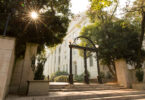Life sciences scholar and author Christopher Thomas Scott will explain the science, outline the issues and discuss the possible achievements of stem cell research as keynote speaker for the university’s Regenerative Bioscience Center Symposium on April 2.
His lecture, entitled “Biology’s Brave New World: Stem Cells in the Coming Century,” will take place at 7 p.m. in Mahler Auditorium at the Georgia Center for Continuing Education and Hotel. It is free and open to the public.
“Chris Scott comes to UGA to help us connect the science of adult and embryonic stem cell research with the varying ethical and social viewpoints,” said Steven Stice, director of the Regenerative Bioscience Center. “His lecture will give Georgians the opportunity to become more informed about the moral and public policy issues that surround the science.”
Scott is executive director of the Stanford University Center for Biomedical Ethics Program on Stem Cells in Society. He was formerly the assistant vice chancellor at the University of California, San Francisco, and was the founder and executive editor of the award-winning biotech journal Acumen.
His most recent book, Stem Cell Now: An Introduction to the Coming Medical Revolution explains the science, ethics and politics of stem cell research to the lay reader.
A businessman and scientist, Scott spent 11 years in the biotechnology industry. He received his undergraduate and postgraduate training in biology from Colorado University as well as a graduate degree focused on biomedical policy from Stanford.
Formed in early 2003, the Regenerative Bioscience Center holds public forums in regenerative science, facilitates cross-disciplinary interactions and supports career development opportunities for new and established investigators at UGA. The RBC symposium is held twice a year in conjunction with UGA’s Human Embryonic Stem Cell Toolbox Workshop. The five-day clinic, sponsored by the National Institutes of Health, gives scientists who anticipate working with embryonic stem cells the most updated information on their derivation, differentiation and use.




